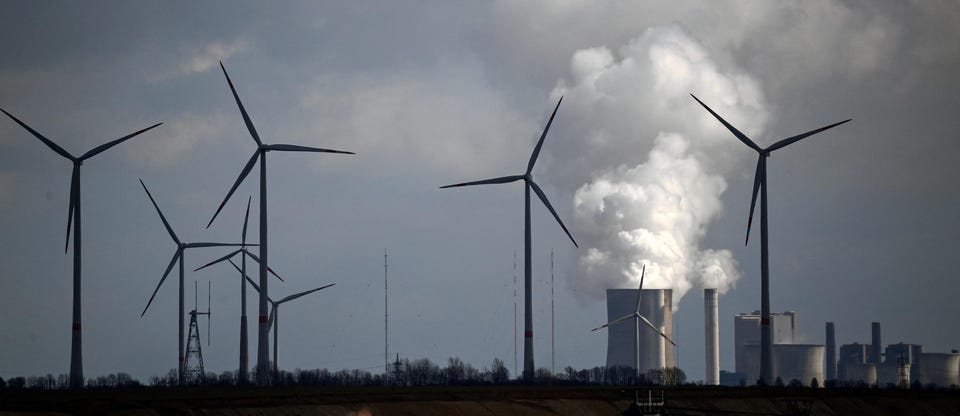Sustainability Germany’s Dependence On Russian Gas Coincided With Drop In Wind Investment Jeff McMahon Senior Contributor Opinions expressed by Forbes Contributors are their own. From Chicago, I write about climate change, green technology, energy. Following New! Follow this author to stay notified about their latest stories.
Got it! Oct 20, 2022, 12:00am EDT | New! Click on the conversation bubble to join the conversation Got it! Share to Facebook Share to Twitter Share to Linkedin Wind turbines are seen near the coal-fired power station Neurath of German energy giant RWE in . . .
[+] Garzweiler, western Germany, on March 15, 2021. – On March 16, 2021, the group will present its detailed figures for 2020, for the last time with RWE CEO Rolf Martin Schmitz. Despite the coronavirus pandemic, 2020 was a successful year for RWE.
(Photo by Ina FASSBENDER / AFP) (Photo by INA FASSBENDER/AFP via Getty Images) AFP via Getty Images Germany was once a leader among nations in the development of wind energy, but after 2015 it curtailed wind investment as it relied increasingly on natural gas imported from Russia. “Had the country followed the same trajectory of growth in annual installations as the rest of Europe, installed wind-power capacity would have been 32 gigawatts greater at the end of 2021,” according to a new report, “ Winds Not Harnessed ,” by the Helsinki-based Centre for Research on Energy and Clean Air. “This additional wind power would have generated more electricity than Germany’s six remaining nuclear power plants in 2021,” the report says, and it would have replaced more gas than Germany imported through the Nord Stream Pipeline 1 before that supply was cut off.
Had it continued its early pace of wind development, Germany could have saved 23 billion euros it spent on natural gas this year and avoided 5% of its energy related greenhouse-gas emissions, according to the report. That volume of emissions is equivalent to all of Switzerland’s emissions last year. “Instead,” the report says, “Germany is entering the first wartime winter in Europe in over 70 years less energy secure than it had reason to be.
” “Installation of German wind power capacity accelerated till 2015 before a period of stagnation . . .
[+] turned into a clear fall in annual installations after 2017,” says the CREA report. Data source: BP Statistical Review of World Energy 2022. CREA Germany’s dependence on Russian gas is often linked to its decision to shut down its nuclear plants in the wake of the 2011 Fukushima nuclear disaster.
But the CREA report argues that wind power could have effectively substituted for that gas. MORE FOR YOU They Inherited Billions Upon Billions: Meet America’s Richest Heirs Today’s Wordle #488 Hint, Clues And Answer For Thursday, October 20th Alef Reveals Prototypes For A Flying Car That’s Really A Flying Car “Gas and wind power have different uses in the energy system, so they are far from perfect substitutes,” the report acknowledges. “However, in the power sector, where about one third of all gas is used in Europe, increased wind power generation will replace gas and coal in a ratio that depends on fuel prices and a host of other factors — this is a simple consequence of the merit order in which the generation sources with the highest marginal cost are used last.
In the extreme situation of a physical gas shortage, gas prices rise so high that the fuel being replaced becomes almost always gas. ” Until the Ukraine war spiked the cost of natural gas, gas enjoyed more favorable economics than coal. Over the last 20 years Germany used more gas as it retired coal and nuclear plants.
Had Germany instead invested in more wind power “it could have significantly reduced Germany’s reliance on fossil fuel imports, thereby lessening the ability of Putin to blackmail the Bundesrepublik by cutting gas supplies,” the report says. “Germany would have been less affected by Russia’s weaponization of trade in energy products, and fluctuations of fossil fuel prices on the global market. ” The thick light blue line at the bottom shows Germany’s actual investment in wind power, which began .
. . [+] to stagnate in 2015.
The light blue line just above it shows the wind power Germany would enjoy now had it continued its own trajectory. The dark blue line at the top shows the wind power Germany would enjoy now had it followed the trajectory of wind development in the rest of Europe. Data sources: BP Statistical Review of World Energy 2022 and CREA.
CREA MORE FROM FORBES Did Europe Move To Renewables Too Fast, Too Slow Or Just Right? By Jeff McMahon Follow me on Twitter or LinkedIn . Check out my website . Jeff McMahon Editorial Standards Print Reprints & Permissions.
From: forbes
URL: https://www.forbes.com/sites/jeffmcmahon/2022/10/20/germanys-dependence-on-russian-gas-coincided-with-drop-in-wind-investment/



